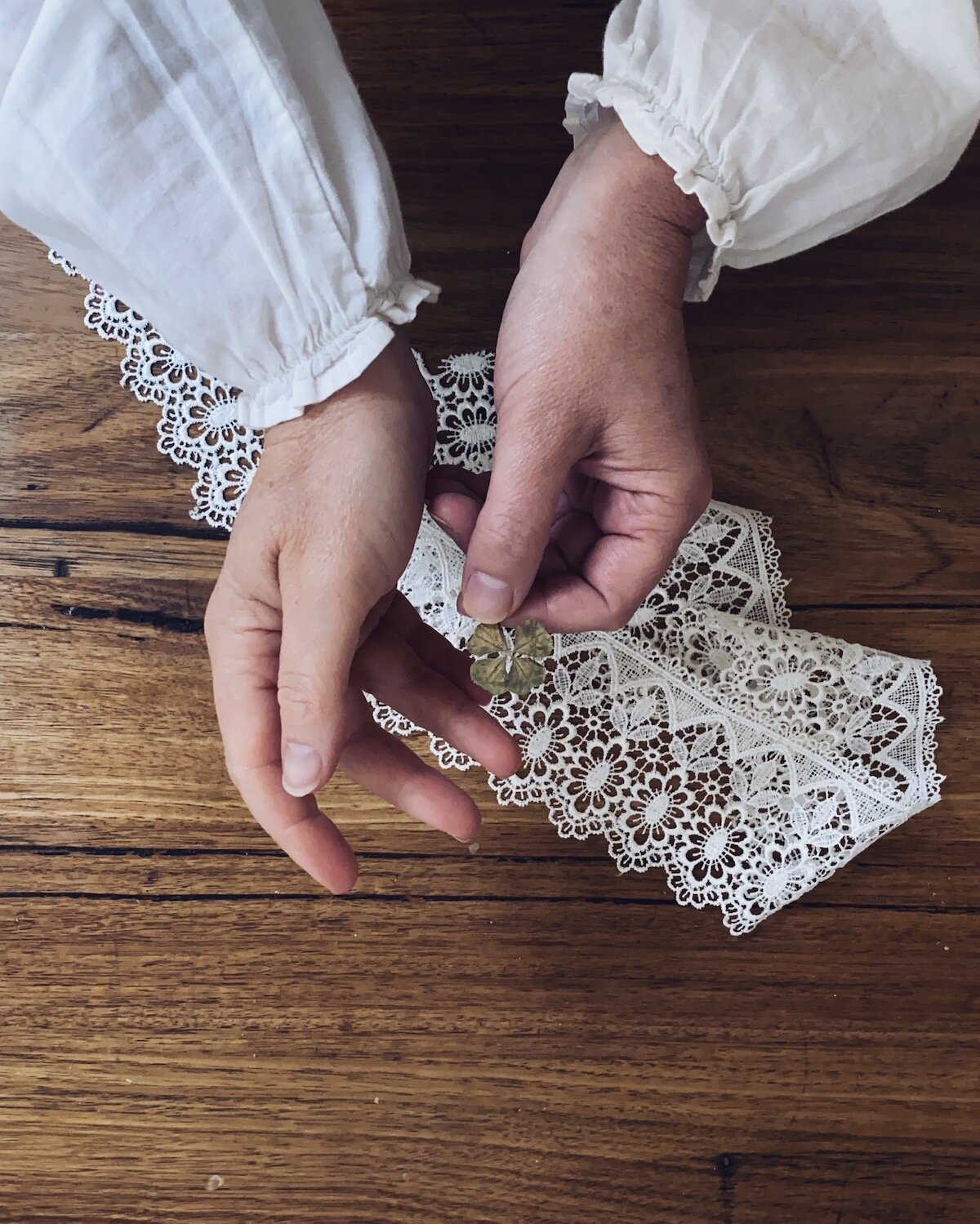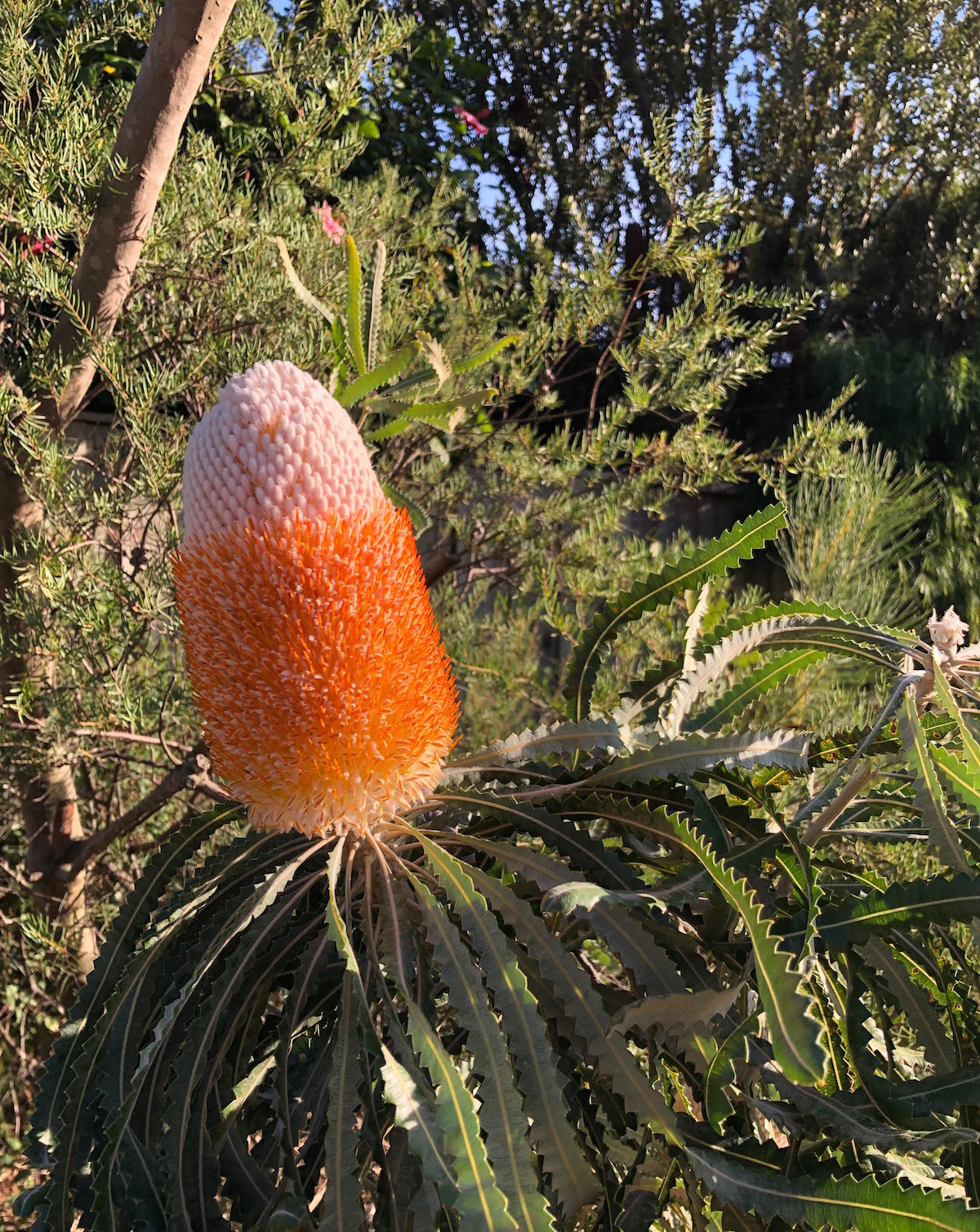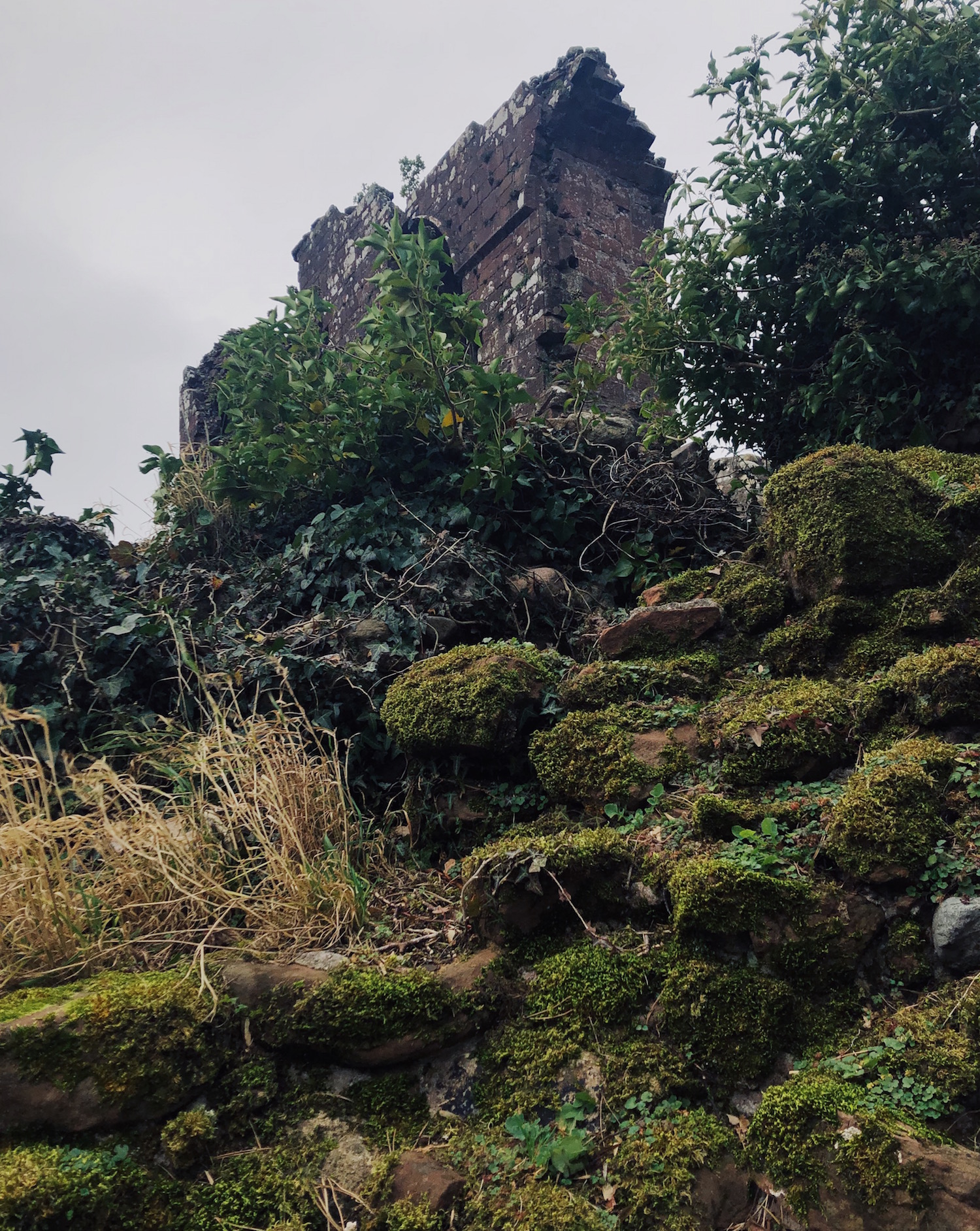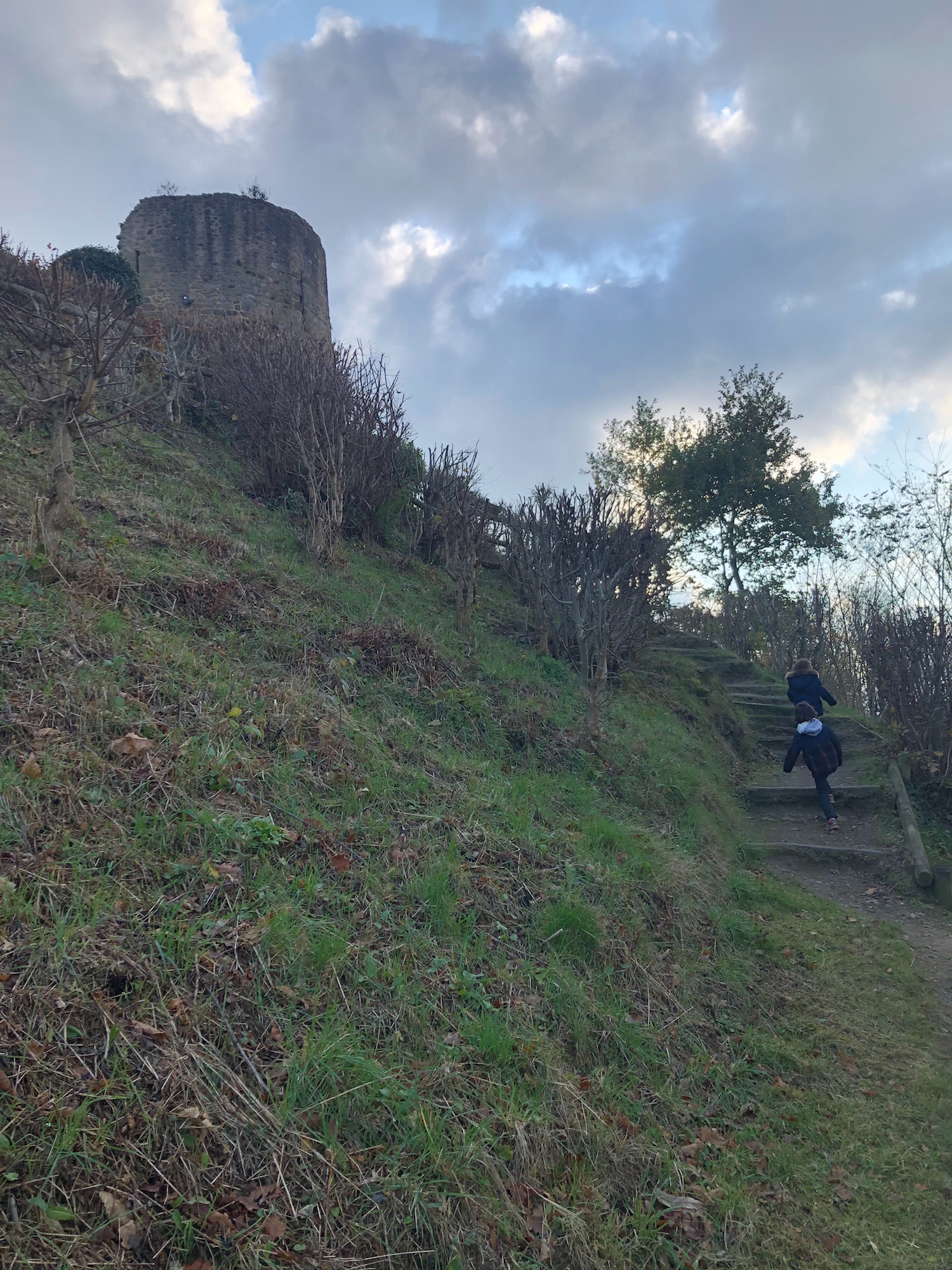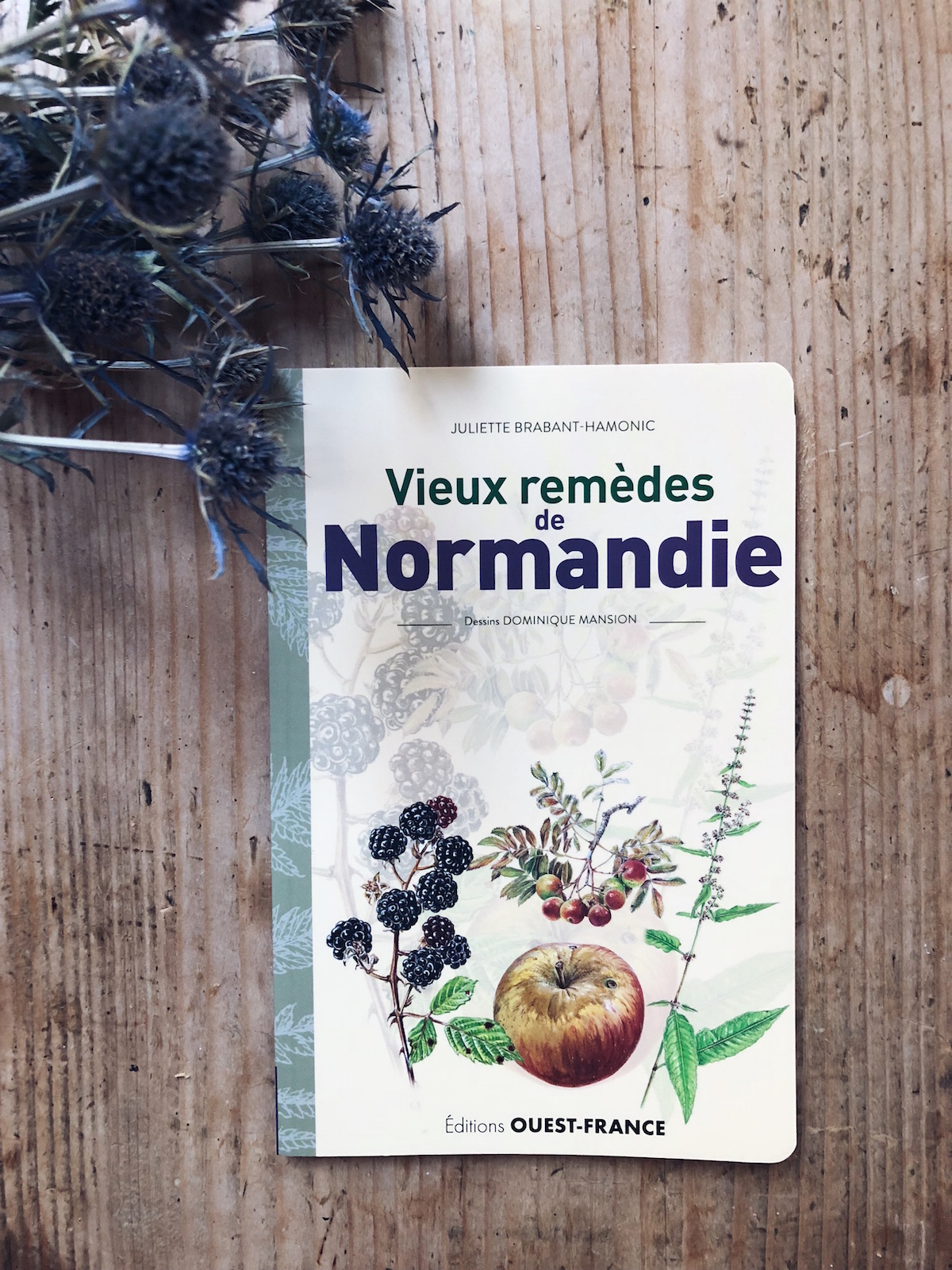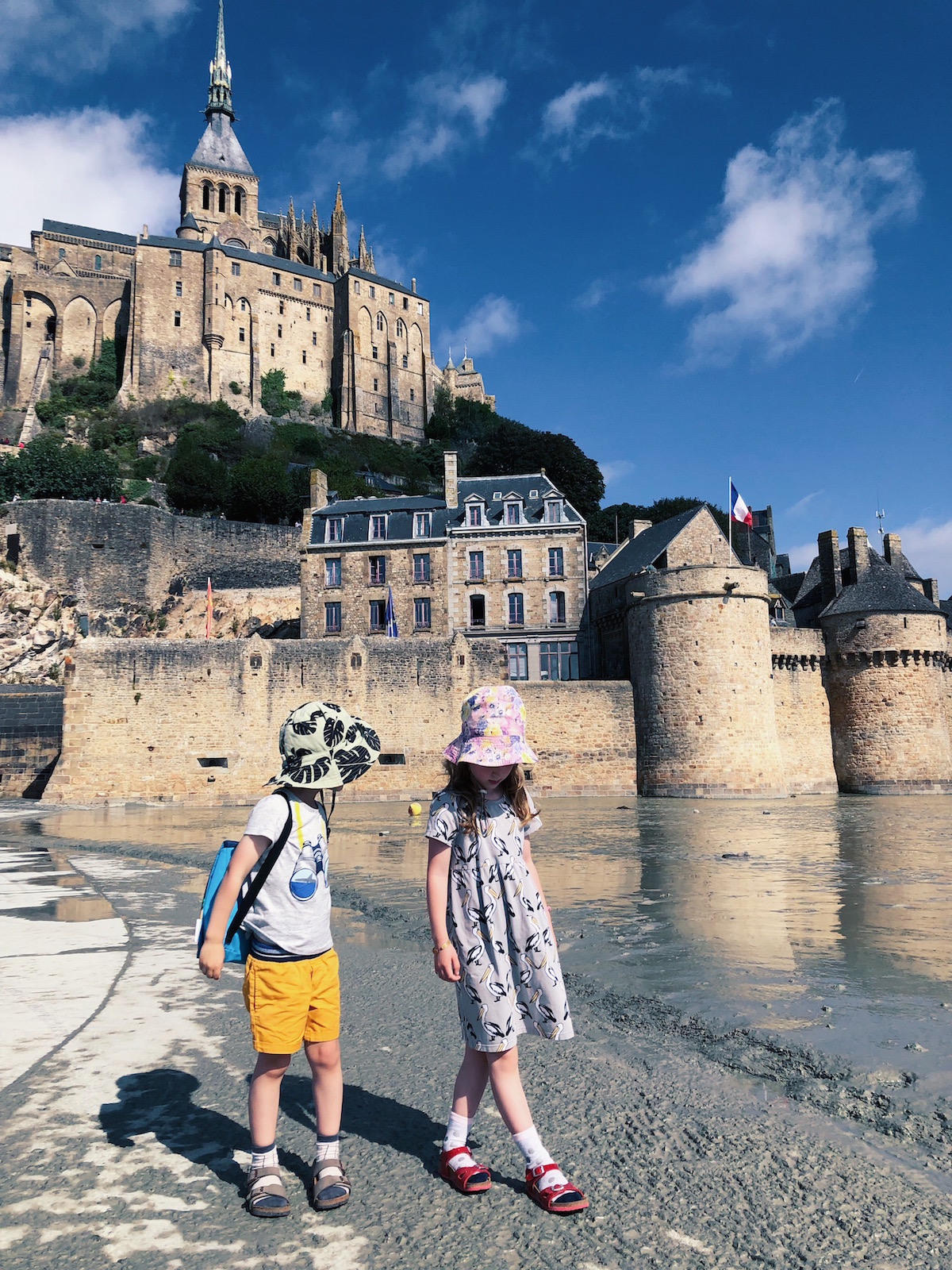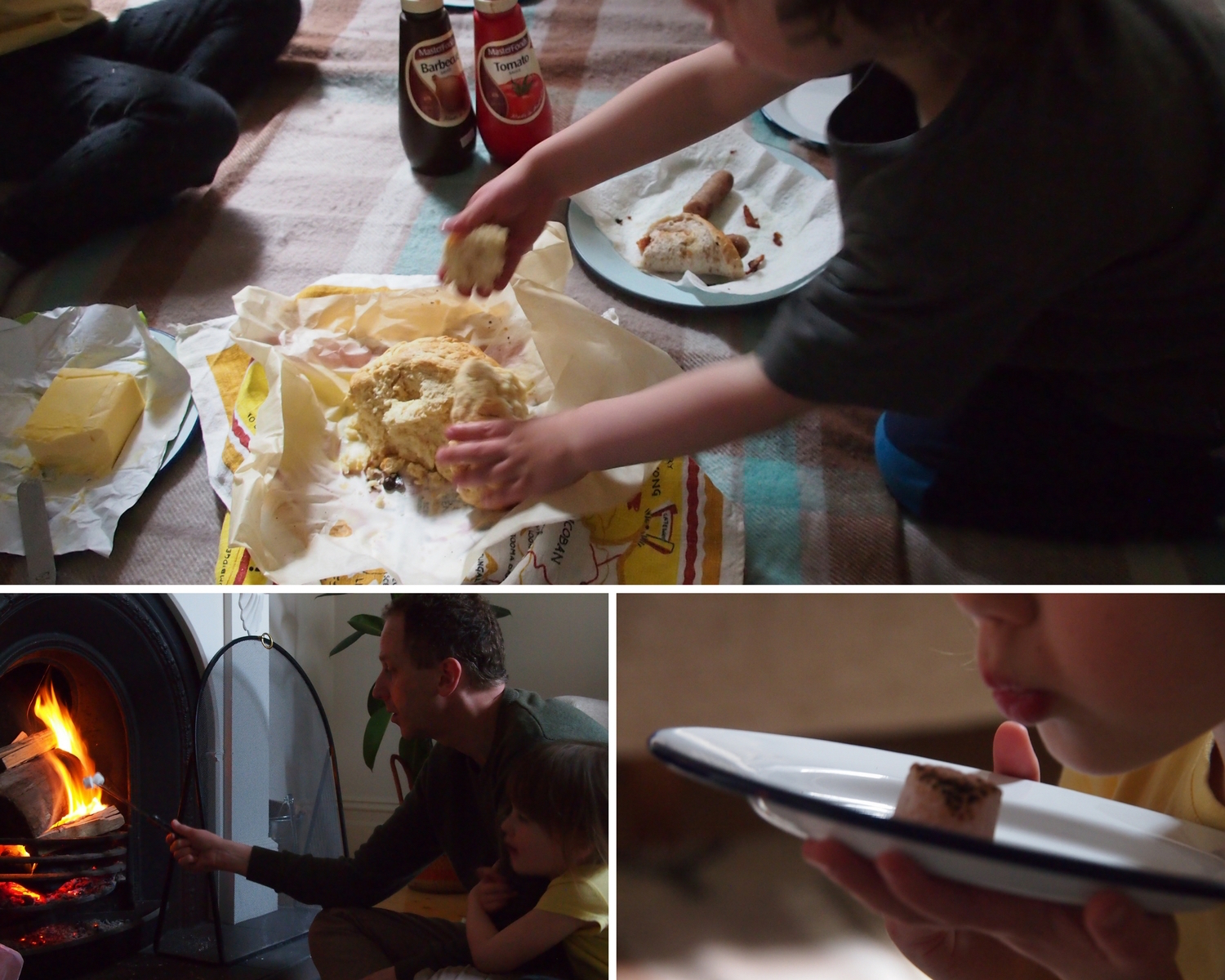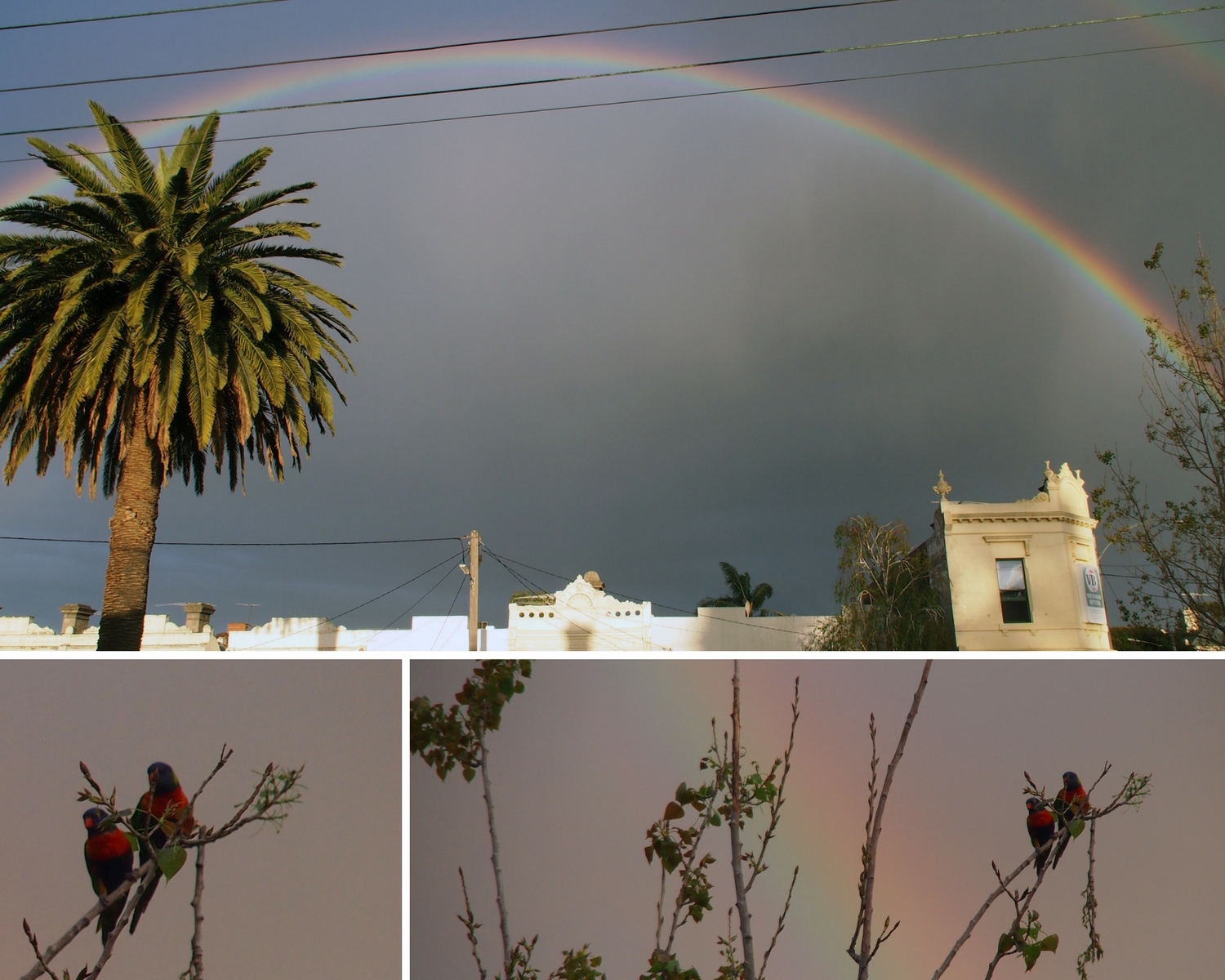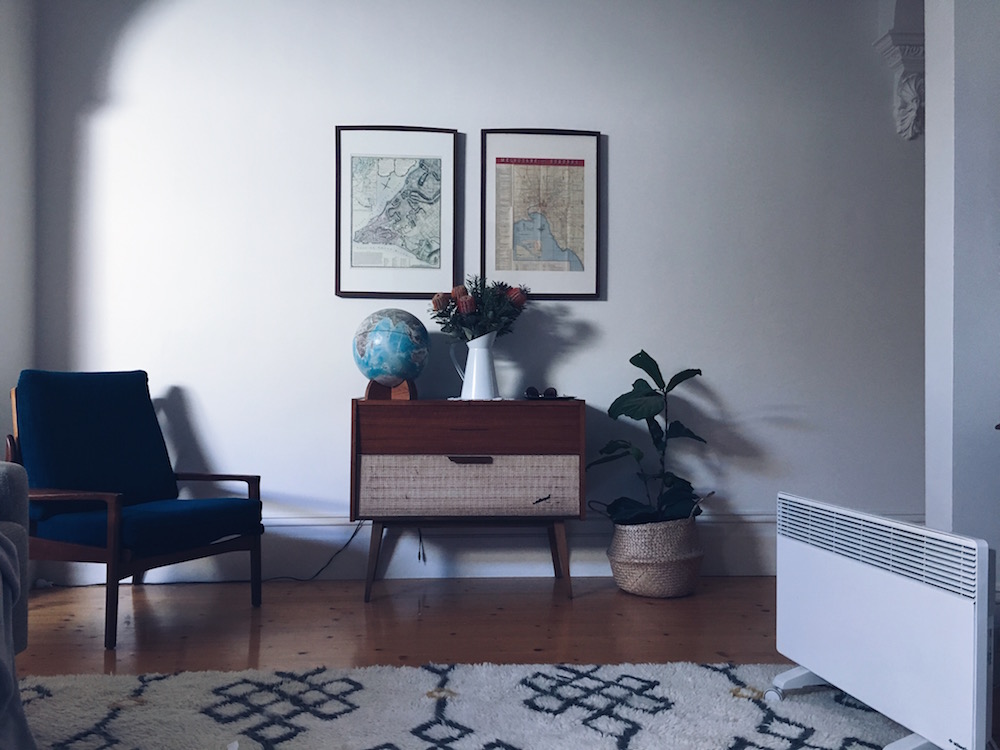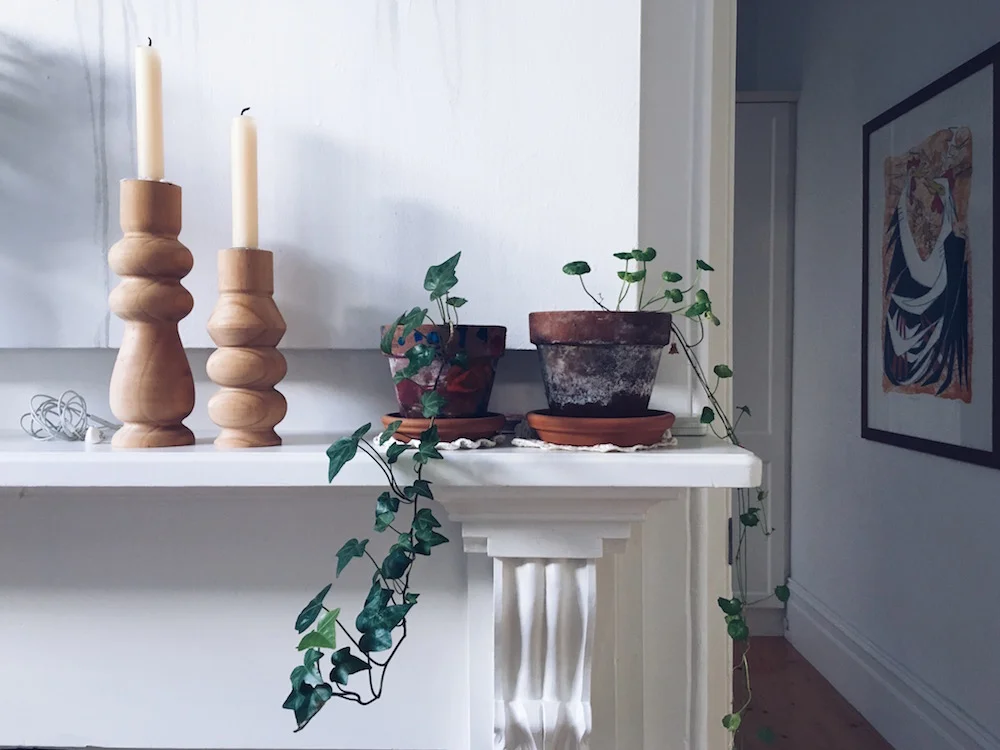
JOURNAL
documenting
&
discovering joyful things
The end of innocence, and other February stories
The first story.
We are all four of us sitting on the floor in the children’s bedroom, reading stories before lights’ out. The book prompts discussion about growing up, and I half-joke to the children, “Never grow up. Always be my babies.” Seven-year-old Scout giggles, and strikes a pose: “I’m already 18 Mummy, I’m about to move out.”
“Oh no!” I mock-wail. “You are breaking my heart!”
Little Ralph, who is six, wriggles onto my lap with a smile. “Don’t worry Mummy, I will never leave you,” he promises, and as I say “Thank goodness!” he throws himself into my arms in a big, hearty bear-hug.
There is a lovely beat of a second or two - Scout and her Dad still laughing, Ralph in my arms - and then I begin to feel him cry. At first I think he is joking but, as the crying melts into sobs and wet tears soak my shoulder, we all realise there is something very wrong.
Ralph can’t find the words for a long time. The sobbing shakes his whole body and I hold him, and kiss him, and smooth his curls back from his wet cheeks.
Later, we realise what it all meant. This was the moment - the exact moment - of his childhood in which he first realised it wouldn’t be the four of us, together forever.
This changes everything. It is the beginning of the end of innocence.
* * * * *
The second story.
I am dead-heading roses before the freshness of the morning gives way to more of this thing we call summer. The little garden is coming back from weeks of severe heat, red rain (rain bringing down red dust from drought-fuelled dust-storms and ongoing bushfires) and heavy winds. The whole garden is somewhat the worse for wear, but beginning to rally.
All four eggs in the blackbird nest have hatched. For weeks, we watch mother and father adjust to new parenthood, racing around the garden seeking food while their babies eat, sleep and cry on steady rotation. The familiarity is not lost on me. We are not so different, the blackbirds and me.
And now as I lop finished blooms from around the deserted nest, I cast an eye over some of the newer roses I planted in spring. They are all-but bare, leaves burned to dust in the intense heat of last week, but Mother Nature never ceases to amaze me. Bending closer, I can see the swellings of green and red buds up and down the branches. Everything begins again.
The air in the garden is thick with happy bees. Forager-bees hurry in and out of flowers that have somehow survived the heat, joyful in the cool of this morning. For breakfast today, nectar of rose, gaura, cosmos, Queen Anne’s lace, clematis, marigold, hydrangea, salvia, valerian, bergamot and stock.
The choir of their hum forms the exact G-chord of the opening bars of John Denver singing Annie’s Song, so uncanny that I glance around, thinking my childhood guitar teacher must be somewhere nearby, about to tell me to practise more.
* * * * *
The third story.
The story begins two years in the past. I am on a coaching call, via Skype, with a lovely Romanian woman called Ana Maria. We are discussing her desire to learn to draw, to find more time for creativity, and her thoughts and fears about the possibility of starting a family. Mid sentence she stops, and I hear her exclaim a delighted “Oh!” across all the oceans that divide us. She announces, “I just found a four-leaf clover!”
(I have never found a four-leaf clover. I used to hunt for them all the time, as a teenager, but never had any success.)
Two years later, last week to be precise, I check my post office box and there, amid bills, bank statements and a 'food ideas' magazine I’m pretty sure I never subscribed to, is a fat envelope, slightly battered and bruised from its journey across continents, covered in Romanian stamps. Inside it is a collection of vintage stationery, pressed leaves, book pages, tea-bags, an old English-Romanian dictionary, antique lace, a sweet letter… and a pressed four-leaf clover.
It is the very four-leaf clover that Ana Maria had found during our conversation, two years earlier. I guess it brought her luck, because that family she talked about starting? Her little boy recently turned one.
In which the author goes to a country wedding, steps in a puddle, and gets philosophical about the passing of time and a misshapen moon
We were at a country wedding on the weekend. It was a perfect, clear and crisp winter’s day and the couple were married in a short ceremony under a simple canopy in the watery sunshine. Afterwards we moved inside to an old farm building with wonky, handmade bricks paving the entry-floor, wreaths of greenery and fairly lights wound around the exposed beams, and a huge, roaring fire in one corner to which we all instantly flocked, hands out.
It wasn’t a big wedding. Most of the people there were family or life-long friends, so there was an easy, informal camaraderie to the room. No set places or awkward conversations with strangers at the table.
At the back of an old wooden stage, a DJ played the kinds of tracks you hear at every wedding, everywhere, and the children, an assorted gaggle of cousins ranging age from five to fifteen, busted their best moves. My two, as the youngest of the group, were often the ringleaders, dragging their older cousins back to the dance floor whenever they showed signs of waning. Later, after the bridal waltz, the grown-ups joined in too, couples dissolving into laughing groups with children riding on shoulders, as we all stumbled through the half-forgotten moves to Nutbush City Limits, YMCA, and the dreaded Macarena. Actually I think they played that one twice.
As the afternoon lengthened and the night grew dark around us, our little party carried on, a bright oasis of laughter and music, shining out from the middle of the otherwise empty fields.
One of the uncles was the first to fold, slumping in his chair beside the table, chin on chest. People posed behind him, bunny-ear fingers hovering over his head, but he gently snored, oblivious. Next to go was Ralph. I sat him beside a table to adjust his shoelaces for half a minute, and in that time he simply lay down, put his thumb in his mouth, and closed his eyes.
Then he opened them again and said, “Mummy, I’m too hot.” I carried him out to the entrance room, stepping carefully in my heels over the wonky, ancient brick floor, and eased the two of us down into an armchair. It was much cooler out there but I put a coat over Ralph and watched the party through the swinging glass doors, as he fell almost instantly asleep.
People came and went, pausing to smile or kiss his dark curls, but mostly it was just Ralph and me, his soft breathing, his sleeping body keeping me warm. I soaked it all in, painfully aware that this time for us, him sleeping in my arms, was not a forever thing.
Recently my friend Sally shared online about the joys of being a parent to her two grown-up girls. She talked about how there is a lot of airspace and celebration given to the precious moments we share with our small children, but less about the changed although still beautiful relationship that comes when they are adults. I was glad she shared these stories - I’m always glad when I hear stories about parents with older children - because I know that my own “precious moments” with my little ones are limited. “Our children are only on loan,” Sally’s mother told her, and she told me, and I wonder if my own compulsion to share these moments with you is because I am trying, through my words, to freeze them in time. As if by writing them down I am forced to be more mindful of them, to appreciate them, before they are gone forever.
Inside the function room, the DJ began playing Walk the Dinosaur. I couldn’t see the stage from my little armchair but from what I could hear, every guest at the wedding aside from me, Ralph and the sleeping cousin was up on the stage, dancing and singing along. And not one of them could hold a tune.
When it was time to leave, my husband gathered up coats, bags and our daughter, and I eased myself clumsily out of that chair, still holding the leaden weight of my not-so-little boy, and clutching a coat over his back to keep him warm as we ventured into the winter night air. I made slow progress back to the car, trying to pick out footsteps in the broken and bumpy unlit path, wearing heels, and carrying a heavy, sleeping child.
Once off the path there was no light at all aside from the stars and we got lost, turning first one way and walking a hundred yards or so before realising our mistake and turning in the other direction, then finally inching our way down over a ditch and into a paddock, to where the parked car gleamed dully in the distance. I shifted Ralph’s weight in my arms, clasping a wrist in each hand to stop him from slipping… and then with a yell I didn’t realise had left my lips until I heard it, stepped into a puddle of mud half-way up to my knees.
Ralph woke to my yell, and we stood there precariously, me holding still him up but unable to get out of the puddle, since my shoes were sunk so deep in mud that they stayed behind whenever I tried to lift my feet out. When my husband came to rescue us, I needed to hold onto his shoulders with both my hands to leverage myself (and my shoes) out of that puddle.
Back on dry land, I poured mud and water out of my shoes as though they were goblets, and hobbled in my swampy, stocking-feet over to the car. The children woke themselves up just enough to find the whole scenario extremely amusing, except that from time to time Ralph would pause the laughter and remember his part in the episode, saying, “Mum, you could have dropped me!” in shocked and accusatory tones.
The moon rose on our drive home. Both children slept in the back seats, and Mr B and I kept up a quiet conversation with one another, more to help him stay awake as he drove, than because either of us had anything particularly important to say. While we chatted, the moon came up big and yellow, a lumpy kind of almost-full-but-not-quite moon. A floating quince in the sky. I watched it as we sped past shadowy trees and black hills that rose and fell beside the road, my mind drifting away from my wet feet and back to the upholstered armchair where Ralph had slept so angelically in my arms, until the city lights ahead stole the moon’s glamour and signalled that we were almost home.
I paused at our front door - a heavy, sleeping Ralph once again resting his head on my shoulder - and smiled up at the quince-moon as it quietly watched us from the eastern sky. I wondered what we looked like from up there. All the moments and events of our short lives, both momentous and minute, weighted equally and witnessed in silence. Weddings, funerals, dancing shoes, swampy shoes. Lovers uniting, marriages ending, mysteries solved, questions forming.
If I think my time with my children is all too short, this must be laughable to the ancient moon, for whom ten years or twenty pass like a breath.
Early the next morning I stepped outside the same front porch, my own breath making mist of the air around me, and watched a hot-air balloon rise in exactly the same patch of sky where the moon had bid me goodnight a few hours earlier. The dawn was very still, and the balloon seemed to be suspended for a moment, not drifting. With its yellow and cream stripes, being almost-but-not-quite round, it looked as though the quince-moon had swathed itself in a coat and defied the very laws of space, refusing to orbit and instead choosing to pause, at least for a little while, in our company. As if maybe she cared.
And then with a loud “pschhh” and a flash of orange flames, the pilot trapped more warm air under the balloon, and it began to rise, slowly floating away from me and into the east. The spell was broken, the moon was gone, and I went inside to make breakfast.
Camping People
Do you ever go camping?
I need to preface this blog post with the confession that we are not Camping People.
This makes me a little bit sad, because I really want to think of myself as a Camping Person. In my head, Camping People are super-evolved. They know how to pare back their living requirements to the bare minimum, ridding themselves of the clutter that threatens to overwhelm the rest of us on any given day, and bringing only what they can carry, leaving behind only footprints in the sand.
Camping People cook delicious one-pot meals in cast iron… (pots? Dutch ovens? What are those things called?) over picturesque fires, with mushrooms and fennel they foraged in nearby pine forests, or mussels they pulled from rocks on pristine beaches. For breakfast they eat bircher muesli they had pre-made in individual mason jars, which they kept cool overnight by submerging them in an alpine-fed stream, Famous Five style. After dinner they uncork the wine, and tell hilarious stories to one another in the glow of the fire. They drape hand-woven rugs around their shoulders as the chill draws in, and they look good in beanies.
We are not those people.
We tried camping, one time. I won a beautiful, canvas tent in a competition, and off we raced to a campsite among the trees in the mountains. I remember it had been a lean week, so I only had $90 in the budget with which to purchase four inflatable beds, one pump, four sleeping bags, two lanterns and four little folding deck chairs, all from K-mart.
Let’s just say you get what you pay for. The pump didn’t work so we had to blow up the beds by mouth, and they deflated during the night to leave us sleeping on cold rocks. Only one of the two lanterns worked. The sleeping bags made up in bulk for what they lacked in actual warmth, and we froze, huddled together on the deflating beds in our winter coats, through the long, six-degree Celsius night.
I had forgotten to bring the instructions for pitching the tent, so we had attempted it earlier that day amid dust and wasps, tripping over pegs and ropes and arguing pointlessly, while a motorhome the size of our home in Melbourne rolled up and parked within touching distance of our tent (we couldn’t even stretch the ropes out fully or we’d have had to peg them into the side of the motorhome). A marathon runner pitched his one-person tent in front of our car, climbed inside at around seven at night, and commenced a rumbling, avalanche-causing snore that continued with impressive consistency until sunrise the next day.
I couldn’t get the kindling in the brazier we’d hired from the campsite ranger to catch alight, despite or perhaps because of the well-meaning aid of the children who plied it with green wood and leaves, but it didn’t really matter anyway because my K-mart budget hadn’t stretched to anything with which to actually cook a meal.
(On the other side of the camping ground, actual Camping People were stirring paella on a little gas cooker, while a teapot suspended over a neat little campfire and children roasted marshmallows on sticks. Later they pulled out camp-chairs that looked like armchairs, and drank wine out of enamel cups. I watched them from the shade of my lopsided tent, through narrowed eyes.)
Because it turns out that, at least for most of us, the amount of stuff needed to actually feed, clothe, shelter and maintain basic hygiene for a family of four is actually a LOT. I mean seriously, there’s so much stuff in camping! Definitely more than we could fit into our tiny Toyota Corolla, even if the budget had allowed me to fully prepare. (The tent alone weighed more than 44 kilograms and filled the entire boot of the car. What’s even up with that!?)
After that one night we hurried back home: filthy, freezing and forlorn. My husband called some friends that same afternoon and gave the tent away, and I donated the sleeping-bags to charity (with a note attached that said “for summer”). We swore we’d never go camping again.
And then we did.
One of the lessons we learned as a family, while we were in France last year, was the importance of taking time out, and switching off, together.
So we cleared the calendar for three nights over Easter. The budget didn’t stretch to much (thanks in part the the aforementioned stay in France) and so, with some trepidation, we decided to try camping again.
It was definitely easier. Not perfect, but easier.
We took the ‘glamping’ route, the best part of which involved someone else pitching the tent, and packing it up afterwards. Oh and floorboards, pre-made beds (with doonas and blankets), a little bar-fridge to keep the milk cool in the absence of any alpine-fed springs, and even a heater!
Of course, we were still covered in dirt most of the time, the campsite showers had scary creatures on the walls, and the campsite ‘kitchen’ was so rusted over I couldn’t even boil water, let alone cook paella. We ate a lot of dim sims from the local take away shop.
And fish ‘n chips on the beach, under a high, full moon.
Actually, it wasn’t that bad.
The children splashed in the icy sea-water, building sandcastles and a conical abbey of sand that they called le Mont Saint Michel. We explored seaside villages and manicured gardens. Old-fashioned hedge-mazes and sun drenched pathways to remote lighthouses.
In the evenings, we read our books and drank hot tea - and later red wine - wrapped in soft blankets. When it was time to turn off the lantern, the moon painted Chinese calligraphy in the leaves and branches of nearby trees on the canvas walls.
I could hear the soft breathing of my family, all asleep but me. Distant waves kissing sand. Night birds. And, on the final night, the winds of a gathering storm.
Maybe this is how Camping People feel.
Golden
Those were golden days.
When we arrived in Dinan, our park was a rainbow cacophony of flowers in bloom, but in the weeks that followed we watched the flowers fade, and the chestnuts begin to drop. The path we walked to get to the playground (the path you see in the picture above above) was like being inside the colour green. The air itself felt green, and the still-warm afternoons were soft, like a hug from nature.
But then, while our backs were turned, everything changed.
The temperatures dropped, and we returned to the playground after a week doing other things to discover green had receded, in the most magnificent of fashions. The park was now shocking, and glorious, and unabashedly golden.
I like to think there is a metaphor in this park for the gold-tinted nostalgia I know I will feel for our sojourn in France in the months and years to come.
There are some things I won’t miss, of course. Being apart from the children’s father for so long tops that list, but I also won’t miss dodging dog-poo on the footpaths, the oven that burned everything, the ever-present smell of cigarette-smoke in the hallway that filtered through to the bathroom and bedrooms, and the incredibly uncomfortable mattresses. The unreliable buses, the way our apartment never felt properly clean… and it will be a long time before I ever want to eat another galette blé noir.
But this park, these children, those are the gold-tinted memories I will carry with me in the years to come. Memories that will turn into nostalgia, long after I have forgotten the grumpy British man downstairs, who liked to complain about the thumps my children made on the floor when they got up in the morning. (It must have been annoying, but there wasn’t much I could do: they haven’t yet learned how to levitate).
Nine hundred kilometres. That’s how far (actually it was a bit further) my children walked during our three months in France. These are the same little legs that were apparently “too tired” to walk the 15 minutes it took to take Scout to school every day last year. Or the three-block stroll to the park.
In France, they would walk, and walk, and walk. And when we stopped walking, they would run, and leap, and dance. I know how far they walked because of the little ‘steps’ app on my ‘phone, by which I kept a tally because the children were so proud of themselves, discovering stamina and resilience they didn’t know they had.
Pepper. That’s how Ralph likes to season his food now. Scout likes her mayonnaise homemade, with enough mustard to give it tang. They eat ‘real’ sushi, tuna salads, vegetable soups, seared steak and soft cheese. They crack their own walnuts and eat them out of the shell. They devour giant bowls of moules marinières (avec frites), homemade muesli, and milk-jelly made using a recipe from Henry VIII’s kitchen. In short, they developed palates in France. And better still, they gained a sense of culinary adventure. Gone are the days of plain pasta and never-ending towers of ham-and-cheese toasties, and chicken nuggets at cafes. Now, they eat what we eat.
When Scout left for Australia she was afraid of all animals. By the time she returned, she was able to play with dogs, ride horses, and care for our baby bunny. At some point in November, while tucked up in bed in our chilly apartment in Dinan, Scout also discovered she could tell stories, and began spinning fabulous and fantastical yarns about faraway adventures, when previously she’d only understood narrative recall.
Ralph began using French words instead of English ones in conversation, without realising he was doing it (and still insisting he couldn’t understand French). He also found the language he needed to describe his emotions, which sometimes threatened to overwhelm him (and then us) when he was tired. He invented phrases like “letting the wolf out” to describe that feeling when anger and frustration took over, so he could tell us what was happening on the inside, before the situation escalated on the outside.
Ralph grappled languages and feelings and currencies and public transport and dropped day-naps with the kind of resilience none of us could have imagined before we left Australia.
But perhaps the most beautiful change I saw - even more beautiful than the foliage change from summer to autumn in our playground - was in their relationship. The children have always been close, a happy side-effect of being born so close together (only 17 months apart), and of sharing a bedroom.
But I watched their friendship blossom in France, alongside their shared experiences and, despite the inevitable arguments, they became a true unit. It wasn’t just friendship: it was trust, reliance, comfort, compassion, and support. The word that comes to me is “tribe.” They became one another’s tribe, and gave one another a sense of belonging that kept them feeling secure despite all the changes and new experiences. It’s something I hope and pray will stay with them throughout their lives.
Because it is golden.
The wuthering north
We drove into Cumbria after dark, just as the winds were picking up. Outside it was right on zero degrees, although the little weather app on my iPhone said, helpfully, “feels like -6”. It did.
The journey had been almost twice as long as we’d anticipated, an unlucky accumulation of London traffic that had continued for three hours outside London; a sun that set at half-past-three in the afternoon, leaving us to navigate our oversized hire-car through steep and winding country roads after dark; and, speaking of navigation, numerous opportunities to take wrong turns and get lost, which we did (there were even road-signs saying “don’t trust the sat-nav”).
From bed that night I could just see the soft, watery light of the crescent moon behind the still-gathering clouds, filtering and refracting through diamond-paned windows that had filtered and refracted moonlight into this room for 500 years, exaggerating the shadows of the beams in our ceiling. The wind was picking up, battering around the ancient walls of our gatehouse in a beautiful fury.
“I love it here,” I whispered to my husband, although he might already have been asleep. “I can’t even tell you. I really love it here!”
The moon was long gone by morning, and the sun was doing its best job of hiding, too, but the grey dawn revealed bare trees and stone walls and crumbling ruins and bracken-covered hills as far as the eye could see. I ran outside in my slippers, hugging my pyjamas close, and drew in the wild view like oxygen.
Back inside, I put on the kettle and made eggs on toast for my family, while the wind positively howled. “Wow!” said the children (about the weather, not my eggs). And as we sat down at the farmhouse table under a window, beside a cast-iron fire that was cracking and popping and spreading warmth, I thought, “We are inside Wuthering Heights.”
Naturally, there was a pretty village nearby, where one could find welcoming locals with musical accents and a cafe with cockle-warming, home-cooked meals. Also naturally, there was a castle ruin, a 900-year-old edifice on an ancient mound that was once settled by Danes and was still part of Scotland until a thousand years ago or so.
I climbed the hill to the ruins alone, while the rest of my family went to find somewhere to buy groceries. The promised “ice rain” had begun, and I have honestly never felt as cold as I did atop that wild and windswept hill, not even on the January night I walked home beside the Hudson River in New York with my friend, and we learned later that it had been -18 degrees.
It was the wind. The wind that burned my ears with cold like razors, stung my eyes with dry tears, tipped me sideways, and genuinely sucked the breath from my lungs whenever I faced into it. Literally breathtaking.
How is it that this world is so full of so many beautiful places? How can we bear it, in our hearts? We only stayed in this ancient gatehouse, perched on the edge of lovely emptiness, for two nights, but I cried for the beauty of it all three times.
I didn’t want to leave. But then, that’s also how I’d felt when first we climbed the steep, cobblestoned streets of Dinan, when we made our picnic under the trees at the castle ruins of Lehon, when we lay down in sunshine among fields of wildflowers in the grounds of Hever Castle, and when we lost ourselves inside the ancient, golden-hued forest of Broceliande. I know I’ve talked about this on my blog before, the twin concepts of home and belonging.
When I married my husband, we made the song Home is wherever I’m with you by Edward Sharpe and the Magnetic Zeroes the unofficial theme-song of our marriage, a testament to where we’d been and where we were going, after I’d left New York to live with him. Every time we moved to a new city, I sought out ways to make it feel like home. I enrolled in a Master’s Degree when we moved to Queensland. I planted a garden when we moved to Sydney. I volunteered when we moved to Adelaide. When we moved to Melbourne, I was already pregnant with my daughter, so new mothers became my community.
I don’t quite know when I started growing restless again. Partly, I think it had to do with having children. The day you hold that new baby in your arms, your world instantly unfolds like a meadow of night-blooming cereus: dazzling flowers, hypnotically-scented, and all opening en masse in one, magic night. But parenthood can also draw your world inside (like the night-blooming cereus closing at dawn, maybe?), and even if you don’t have kids, you’ve heard enough stories from friends and siblings and aunties and grandparents… or read enough mummy-blogs… that you don’t need me to talk about that odd and disorienting and beautiful and isolating parenthood bubble right now.
My point is that becoming a mother, while undeniably the best decision I ever made and the best thing I will ever do, also taught me to see my home-town in a different way. The exciting cafes and galleries and festivals and street-art and food trucks and pop-up events that once helped me fall in love with my city became, almost overnight, all-but lost to me, sitting at home with sleeping (or not-sleeping) babies while my husband worked 100 hours a week.
I have watched the world go on without me, from the distance of the Internet.
And when you take away all the wonderful things about life in the city, you start to notice the restrictive things. The lack of fresh air, open spaces, and trees. The reliance on other things (shops, cars, telephones) for even the most basic necessities of life. With a fidgeting toddler in one arm and a hungry baby in the other, the world feels as though it doesn’t belong to you any more, and for those of us used to being “in control” in the workplace, this new workplace feels about as out of control as workplaces come.
So, as I stood alone on that ancient hilltop in the breath-stealing wind, these were some of the thoughts that were going through my mind. I wanted to live in this place more than I’d wanted to live anywhere, ever. I sort-of cried, again, but I didn’t truly cry, because the wind stung my eyes and dried my tears before they could fall.
We won’t be moving to Cumbria any time soon, no matter how badly I want it. And the truth is that even more than I want that open-fielded life, I want to stay with the people who fill my life right now. They are my home, wherever I go (Home is wherever I’m with you).
After I climbed down from the castle ruins, I found my family in a little second-hand shop on the high street, deep in conversation with three locals who had each lived in this village and known one another for eight decades, or more. They recommended the fish and chips shop for lunch and, an hour or so later when we bustled in from the rain and found somewhere to sit, our new friends were already ensconced around a table at the back.
As we left, my husband secretly paid for their lunch and another round of their coffees, and it’s times like this that I remember why I first made him my home.
The truth about what happens on our walks
Chevalier Ralph clambered up onto the rocks by the path, to his look-out. “Can you see the advance guard?” the Warrior Queen Scout called up to him, “Are they close yet?”
We all peered through the forest trees and across the canal, to the hiking trail on the other side. Two retirees carrying trekking poles were striding along the path. “I see them!” yelled Chevalier Ralph. “They’re almost ahead of us!”
And then at the same time, both children looked further into the distance, and stiffened. A walking group of about 20 more retirees had rounded the corner of the path across the river, behind their two ‘advance guard’ friends.
“The pack! The pack of oldie chevaliers!” the children yelled, in mock terror. “Run!” And so we ran, a mad race to the old castle ruin, us on one side of the river and our unwitting enemies on the other.
We were two chevaliers and one warrior queen, you see, and we alone knew of a plan by our arch enemies to attack our castle. They intended to sneak up on the castle, cunningly disguised as an innocent-looking walking-party of octogenarians, then storm our walls and take the kingdom.
Luckily, we happened upon them during our walk. Now it was up to us to get to the castle before them, and save the day.
We raced along the forest path, past the ancient abbey with scarcely a glance, and scrambled up the steep hill to our fortress, all the while listening for the sound of deceptively-benign conversations about chestnuts and knitting and grandchildren.
Once there, we pulled up the imaginary draw-bridge, locked the non-existent gates, and armed the crumbling battlements. Hastily (there was no time to lose!), we reached into my backpack and added to our number: the castle was now under the protection of Chevalier Ralph, Chevalier Mummy and the Warrior Queen, as well as a soft toy Lightning McQueen, another soft toy Harry Potter, and a little plastic dog from Paw Patrol, called Chase.
The toy chevaliers protected the most vulnerable aspect of the walls, overlooking the valley, while the three of us checked every other side, craning our necks for enemies disguised as grandparents. We sent messages via carrier pigeon to the next town over, warning them of imminent attack.
At this point the Warrior Queen decided she was no warrior after all, but just a plain old queen who needed protecting. After about five minutes of that she found that being helpless was boring, and so miraculously developed the powers of flight. A man wielding a leaf-blower in the village below was actually a dragon, roaring with fury and spewing dust and leaves.
Chevalier Ralph stopped bing a chevalier and became instead a superhero, by the name of SuperBoy. As we headed to the neighbouring village, we had to stop multiple times for SuperBoy to throw stones into the canal, as this was the only way to recharge his waning superpowers.
Soon after this, the adventure grew so complex that it is impossible to explain. Suffice to say we won the day, both sides of the war agreed to make friends, and we celebrated with chocolate eclairs and raspberry tarts on the way home.
Pilgrims
The day started at 2:42am, with a blood-curdling scream issuing from the children’s room. I barrelled in, stubbing my toe on the dressing table then tripping over the low bed they share, to discover Ralph sitting bolt upright, in the aftermath of a particularly bad dream. He was trembling, so I held him and kissed him until he calmed down.
When at last he lay back down on the pillow, he fell instantly back to sleep. Scout rolled over, kissed the back of his head, and wrapped her arms around her little brother to keep him secure. “Ralph, you are lucky to have such a loving sister,” I said. Scout whispered into his curls, which were still damp with perspiration from the nightmare, “I am lucky to have him.” And then she, too, sank back into sleep.
By the time I made it back to my own bed, I was so full of adrenalin it took forever before I found my own way back into slumber, and it felt like only minutes before the charms of my alarm woke me again at 5:30am. I groped through the dark a second time, this time on tip-toe, to put the kettle on in the kitchen, prepare breakfast for the children, and pack a lunch for the day ahead.
An hour later, the three of us were creeping through the still-dark village, whispering so-as not to wake the locals. It was like a magical other-world in that pre-dawn dark: cobblestones shining under the orange lantern-light, and not even a whisper of a breeze. It felt, truly, as though we had stepped back in time. I was thinking this to myself as we tip-toed toward the bus-stop, and then Scout said to us, “This morning, the town belongs to us.” So I guess she felt some of the magic, too.
We made it to the bus-stop five minutes early. And stood there shivering in the dark. I put my arms around the children and Ralph said, “You are our mother-hen.”
Time for the bus, but no Line 10 to be seen. We waited a little longer in the dark, watched other buses come and go, shivered a little more, cuddled a little more. I pulled the timetable out of my bag and checked again: yep, I had the days right, and the times. We wandered over to the bus-shelter at the other side, to read the same timetables that were pinned to the wall…
… only, it turned out they weren’t the same timetables. I looked up at the wall again. Turns out, the bus-times changed when the calendar changed, and our bus had rolled away five minutes before we had arrived (probably right about the time Scout had said, “the town belongs to us”).
“There’s another bus in two hours,” I told the children. “We could take that? It won’t get us all the way but we could at least go to the beach.” They took it well, the excitement of the early morning and the walk in the dark still pumping in their veins, and didn’t even want to go home in the meantime. “Let’s just wander around,” Scout pleaded, but even I have my adventure limits, so we turned for home to pass the time until daylight.
(We had a win on the way back: our boulanger was open. By way of compensation, I bought them each a pain au chocolat, still warm from the oven, and picked up a baguette to add to our picnic later on.)
Using the Internet back home I discovered we could cobble together trains and buses and make it to our original destination only an hour later than planned, so out we trundled again an hour after that, ready at long last to begin our pilgrimage.
Walk. Train. Wait. Bus. Walk. And then another walk, a long walk, in the sun. The children were disappointed: they had hoped to risk the tides and wade through silt and sand to reach the island, but it turned out that a perfectly crafted boardwalk unfolded ahead of us, and our pilgrimage felt a lot easier, and more sanitised, than we had envisioned.
But the heat had become searing, and a long walk, when you are only four years old and had an early morning with multiple mishaps and the sun is bearing down on you, can quickly become arduous. We tramped on, at what felt like a snail’s pace (aka Ralph’s pace), feeling as though we were making more authentic, pilgrim-esque, effort with every step.
And then, carrying softly across the sand amid the chatter of thousands of other wayfarers, the noon-day church bells began to ring. So we marched onwards with renewed vigour, following the call.
Inside, I had been hoping to find ghosts. I’m good at finding ghosts. I can find the magic in even the most touristy of places, if once there was true magic. (Like Notre Dame, for example, where I once filed in with a million other tourists but still managed to still my soul and feel the prayers, hundreds of years of prayers, fluttering toward the cathedral ceiling like a million butterflies.)
But as we strode over the drawbridge and under the portcullis and filed into the medieval village, packed shoulder-to-shoulder with what felt like every other tourist in France, the ghosts were silent. Scout and I shared a big bowl of moules frites (Ralph had pizza), and then we rejoined the throng on the climb up the hill to the abbey. Poor Ralph tripped over on the pavement and almost got trampled by a German tourist and his dog. We dusted him off, dried his tears, and carried on. A few minutes later, he bashed his head on a flying buttress. We crammed against a wall and tended to him again, kissing the forehead where a lump was rapidly rising, but my little champion rallied and we resumed our climb. Several flights of stairs - me holding tight to Ralph’s hand to stop him stumbling - and we made it to the top mercifully without incident.
There, at last, the crowd thinned. We all three took a breath, opened our arms to the breeze, and discovered that we were, in fact, on top of the world.
I had been hoping for the ghosts of the past but what I found instead were spirits. Soaring, swooping, invisible and yet profoundly present. Open-armed, open-hearted, open-minded.
On our way inside the abbey, Ralph fell in the gravel and skinned his elbow and both knees. But he got up, and carried on. Heading home, now in searing heat, we discovered the lines for the horse-drawn carriage I had promised them, and also the more mundane but infinitely more practical buses, were so long, we’d never make it back to our bus and the last train on time.
I looked at that boardwalk, stretching out in front of us, and then I looked at my beautiful children, already drooping and exhausted. I didn’t know what to do. “I don’t know what to do,” I said. The words escaped me before I could stop them.
“We can walk Mum,” my little champions assured me. “Don’t worry!” I grasped both of their hands and began to power-walk, the two of them trotting along either side of me. Stress prickled me on the inside. The signpost said the walk should take 45 minutes: at Ralph pace, that meant at least an hour and a half. We had half an hour.
I’m not going to lie, that was a rough half hour. When Ralph fell yet again, I almost thought we were done-for. But those valiant children carried on. We made it to the bus with less than a minute to spare (I’m not kidding: the bus-driver was closing the doors as we stumbled up, sweating and panting and pleading), and both children wilted like flowers into their seats.
In all, they walked 14 kilometres in aching heat, and 14 kilometres in the heat is a long, long walk for two little children, not to mention the numerous bumps, bruises and grazes picked up by Ralph along the way. My heart swelled for them. Pride, joy, mother-guilt and love all mingled together at the way they had carried on forward, not complaining, in all that difficulty.
And then I thought about the air at the top of that abbey, and the way the wind had unravelled across the sandy flats to the sea with heart-stopping freedom, and how those same weary children had opened themselves to the wind with such enthusiasm that it was infectious, their evident joy and laughter spreading to the other tourists around them in smiles and giggles and sighs.
And then I thought about spirits, soaring.
Inside camping
Get ready kids, we are going camping!
First, pitch the tent. We'll need damper, can somebody rub butter into flour? Light the campfire.
All set? Let's play some card-games on the picnic rug. Snap. Go Fish. Close your eyes and guess what food I'm putting into your mouth. Oh no! Who could have predicted that game would end in tears? Shall we snuggle inside the tent for a little while, and tell spooky stories?
Dinner time! Who wants another sausage? Can you pass the damper? Cocky's joy, anyone? I have a great idea: let's roast marshmallows!
WHAT a sky! The rainbow lorikeets are loving it, too, they are making quite the racket. I think it has stopped raining.
But brr, it's getting cold, and almost dark. I have hot milo in the thermos. Come on, let's cuddle next to the fire and look for pictures in the flames until we fall asleep.
Have you ever tried inside camping? It's a fantastic rainy-day activity, and has the benefits of being warm, cosy, and completely screen-free!
I've made you a handy guide to inside-camping set-ups, games and food (including a damper recipe that can be adapted for cooking in a campfire or in the oven). You can download that here, and of course don't forget you can always pin it for later. x
Dispatch from captivity
Captain's log: Day Eight of captivity
Our entire family continues as prisoners of a criminal gang known as The Flu. The gang took Ralph first and, while I was trying to rescue him, they nabbed me too. We were dismayed but not surprised to see Mr B and Scout join us two days later.
Initially I thought Fever and Sore Throat were the gang leaders, although Fever hasn't been seen for about 24 hours, which is a small relief. He has left us in the unfortunately very capable hands of Cough, Congestion, Headache, Nausea and Fatigue, and they seem to take great delight in torturing us by turns.
Early on in my captivity I tried escaping via hot drinks made with turmeric, ginger, citrus and raw honey, but Nausea uncovered my plan, and punished me with severity.
At about Day Three I tried opening all the doors and windows to let fresh air back into the house, in the hopes that it might even blow some of the gang members away. In retaliation, Cough viciously set upon my children, and Sore Throat held a blow-torch to my larynx.
The continued captivity is weakening my mind along with my body. I spent a week texting my father to see if his birthday present had arrived, only to discover it sitting still-unsent on my work-bench. I tried to do some drawing for my clients, but could not remain upright or hold a pencil for more than 10 minutes at a time.
When the gang members work together to torment us, it is worst of all. They force us to lie down on couches under blankets, and watch endless back-to-back episodes of My Little Pony on Netflix. The makers of My Little Pony scoured the globe for the world's most boring pre-teen girl, then stole her diary and used it to make a TV show about multi-coloured horses with enormous bug eyes. Watching it is the most appalling form of torture.
I have been informed by the grocery delivery-man that the apocalypse hasn't happened yet and that the world is still turning outside the four walls of our captivity, but only time will tell if we ever get to see it again for ourselves.
If you find this, tell my mother I love her.
I wasn't ready
Scout turned five last month, and I didn't see the milestone until I almost tripped over it. Rubbing my emotional stubbed toe, I tried to take it all in. She is not a toddler any more. Five is, well, five is a kid. She laughs, she dances, she tells jokes, she writes her name on pieces of paper and leaves them all over the house. She turns on lights and opens doors without asking for help. She listens to reason (most days.)
I didn't notice the growing-up coming until two weeks before her birthday, when she announced one morning that she was ready to have her ears pierced. "Okay," I said, "let's do it. We'll go tomorrow." She spent the next 24 hours literally vibrating with excitement. "I can't believe this is really happening!" she whispered to me at bed-time. "It is actually happening!"
The next morning - after an agonisingly long time spent deciding on which surgical-steel earrings would be used for the piercing (she eventually chose gold studs with pink stones) - we sat together in a tiny clinical room, ready to go. I was more nervous than Scout was, my nerves somewhat exacerbated by the eccentric pharmacist who was doing the piercing. He insisted on following a checklist of warnings and health-risks, reiterating worst-case scenarios in graphic detail, and even interviewed my still-four year old daughter about pre-existing piercings and tattoos, then double-checked: "Have you been drinking alcohol today?" (I only just resisted the urge to ask him, "Have you?!")
Afterwards, over celebratory hot drinks at the local deli, I felt a kind of grief. Scout just looked so grown-up with those earrings shining from her still-red lobes. But it wasn't only about her appearance, it was also about what the earrings now symbolised. My little girl had voluntarily agreed to have holes put in her ears. And let's not sugar-coat it, they hurt, going in. I had warned her that they would hurt but she choose to go ahead anyway. After the first ear was pierced there were some tears, but she still chose to continue. She straightened her back and squeezed my hand just a little tighter, ready to go.
It was her decision to endure the bad thing to get to the good thing that had me swallowing sobs along with my coffee. There was only one way to describe what was going on with that kind of thinking: maturity.
Twice a week I pack a lunch-box and Scout goes off to kinder. The packing of that lunch box is one of the highlights of her week, and many an ernest discussion is had over its contents (including one time when I ruined an entire 500-gram block of tasty cheese by carving out three long tubes with an apple-corer, so that she could have "cheese fingers" like the pre-pacakged ones her friends had).
She speaks with a little lisp, slightly more pronounced right now because yesterday, just after breakfast, she lost her first tooth. There it was: a tiny, tangible, undeniable symbol of the relentless forward-rush of time. She held it in her hand and stared at it with a mixture of surprise, wonder, fear and pride washing over her face like a silent movie.
Next year, Scout will go to school, and I will be packing her lunch-box five days a week. The following year I'll be packing a lunch-box for Ralph five days a week too.
And what then? I am not ready.

